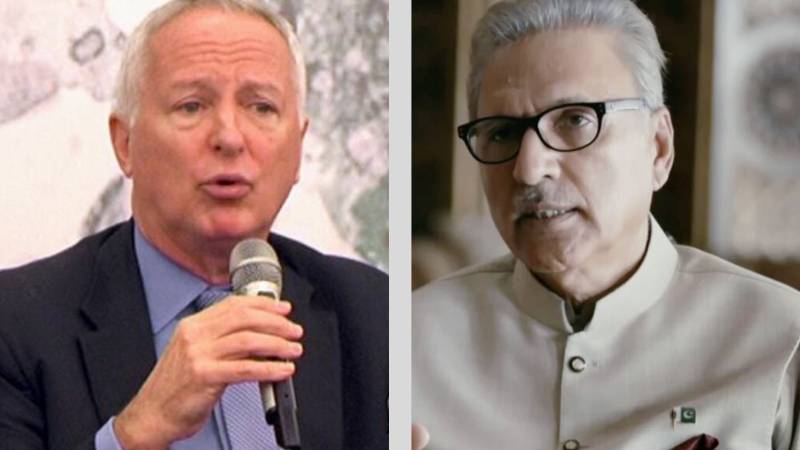Munter fears water war with India, Alvi highlights Pak peace overtures
President says Islamophobia is among latest global challenges

Stay tuned with 24 News HD Android App

Former US Ambassador to Pakistan Cameron Munter has expressed the fear that India and Pakistan could fight a war in future over sharing of water resources.
Addressing a conference on Wednesday in Islamabad, titled “Global strategic threat and response 2020”, he said that during his stint as US envoy he had apprised his country about the issues faced by Pakistan.
Chief of Air Staff, Air Chief Marshal Mujahid Anwar Khan, renowned defence analysts, experts, diplomats and academics also attended the event.
Addressing the conference, President Dr Arif Alvi said that Pakistan understood the value of peace and it had been continuously talking of peace which was in sharp contrast to the belligerent designs of India.
Munter in his address said that Pakistan needs to refocus its economy on technology instead of having a heavy reliance on the textile industry. “Throughout the world, the profits from textile products are declining,” he pointed out.
The US diplomat also said that Pakistani youth need to gain expertise in software and information technology.
The statements of the former US envoy come amid foreign media reports that India will no longer let its share of water to flow into Pakistan from December.
The Indus Waters Treaty signed in 1960, gives India control over the three eastern rivers (Ravi, Beas and Sutlej) of the Indus basin while it gives Pakistan rights over the three western rivers (Indus, Jhelum and Chenab).
The treaty also guaranteed 10 years of uninterrupted water supply, during this period Pakistan was to build dams. Pakistan built Warsak, Mangla and Tarbela dams during that period.
India is planning to stop two TMC of water of the Ujh river, which is a tributary of the Ravi river that flows through the Kathua district in Indian Occupied Kashmir.
Basing the news on a source, an Indian media outlet claimed that a technical report has been prepared on it and is awaiting an official response to go ahead.
Last year, Indian Union Minister for Transport and Water Resources Nitin Gadkari had said that the government was planning to build three dams in Uttarakhand to stop India’s unused share of river water from flowing to Pakistan.
President’s address
President Arif Alvi in his speech said that Prime Minister Imran Khan offered an olive branch to India for resolving all the issues peacefully.
But he regretted that PM’s offer of ‘taking two steps if India takes one’ was not reciprocated by the eastern neighbour.
Pakistan, as peace gesture, had also returned the Indian captured pilot Abinandhan, despite Indian aggression during February last, he pointed out.
Alvi said the global order was rapidly changing but he was disappointed with such developments as the humanity still refused to learn from its bitter experiences of wars.
History bears witness to the fact that war has been used in the past as a tool for exploitation and loot of the regions and resources and with the passage of time, dynamics of warfare undergone a sea change from gun powder to the supersonic missiles, he observed.
"The Muslim world has also suffered due to the interests of others."
He regretted that mercenaries had been used in the war in Iraq and the impacts of such conflicts were evident in the region.
The president said the new global order was not going to give peace. The world had been confronted with the latest challenges like xenophobia and Islamophobia.
Due to these changes and threats, it was necessary for Pakistan to have the nuclear capability to thwart all ill designs of its enemies and secure itself, he added.
"Western interests are swaying the global bodies in which morality and justice often found no place."
He referred to the perilous situation in the Indian Occupied Jammu and Kashmir and the latest attacks against Muslims and carnage in India to make his point.
The president also shared his concerns over the ‘new destructive economic order,’ quoting certain renowned authors and scholars.
He observed that in the modern warfare and technological revolution, it had become imperative to preserve resources, besides adoption of a strategy to look beyond the current trends.
Along with such issues, poverty, education, health, pollution and social disparity were the other common challenges, faced by the world community, he added.
The president said it was an era of cyber and hybrid wars and the technological revolution. About the impacts of social media, he said that now these tools were used to affect minds of the people which could be another type of warfare.
